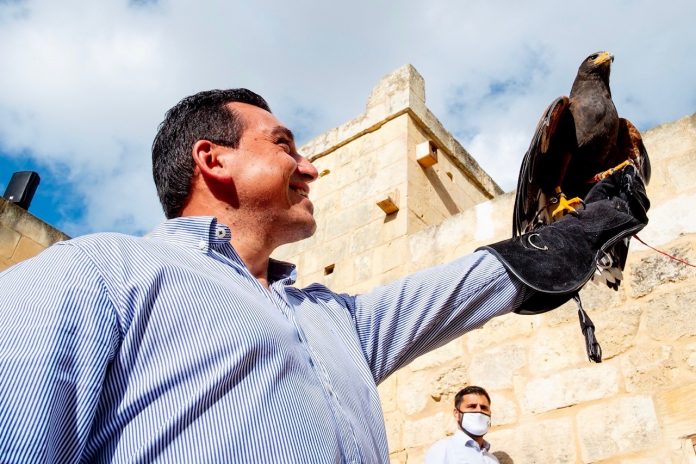It is our duty to protect both our cultural and environmental heritage, to maintain the potential of biodiversity to meet the needs and aspirations of present and future generations, the Minister for the Environment, Climate Change and Planning Aaron Farrugia said.
Minister Farrugia was speaking during an open day organised by the Federation for Hunting and Conservation Malta (FKNK) in collaboration with the ministry which was organised with the aim of promoting this Natura 2000 site and its rich biodiversity.
The event served as a positive educational experience for visitors as well as an awareness-raising exercise. At the height of migration for many bird species, a number of birds can be seen flying over Buskett. Members of the Malta Falconers Club were also present with a number of birds of prey.
The minister explained that the area of Buskett is amongst the most important Natura 2000 sites in Malta as it is important grounds for many plants, birds, mammals, reptiles, and insects. In view of this, it was declared a Special Area of Conservation (SAC) and Special Protection Area (SPA). A management plan for the site was developed and a project was implemented to increase woodland coverage, encourage citizen engagement, and proper management of the site.
He explained that in order to implement further initiatives and involve civil society, the ‘rziezet’ in the area were assigned specific funding and functions, one of which is ir-Razzett tal-Bagħal, managed by the FKNK. The ministry financed a project at this razzett for the rearing and release of barn owls, a resident bird of prey. “Such processes of reintroduction and conservation are both very important approaches in conservation efforts. This type of reintroduction is widely accepted as a means to improve the conservation status of species that have suffered population decline usually due to human impact”, he continued.
“If properly empowered, different types of people from different walks of life can contribute positively to our natural environment. We need to understand those who live a rural lifestyle, and respect our cultural heritage, but most importantly, understand the value of effective dialogue, of balance, and recognise that various sustainable activities can be more than compatible with conservation objectives and contribute positively to biodiversity in many sites, especially within the framework of a management plan. Effective dialogue and partnership between environmentalists, hunters, farmers, landowners, authorities, and keeping an honest and open mind and mutual understanding can be transformative: creating solutions for a variety of problems, from biodiversity to conservation to rural development to climate change”, said the minister.
Environment and Resources Authority (ERA) Deputy Director for Environment and Resources Darrin Stevens said that ERA welcomes projects aimed at reintroduction of native species, including the barn owl and Maltese trees, since it is believed that the environment can be improved with joint collaboration.
“The fact that government entrusted such an important heritage site and that the minister for the environment has shown full trust in the resources and skills of the FKNK is an important fact. We promise to reciprocate with facts by means of projects that encourage conservation and enhance biodiversity”, said FKNK President Joe Perici Calascione.
Photo (DOI/MECP)










